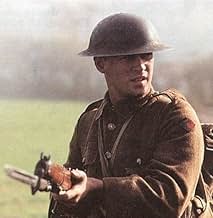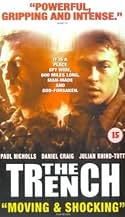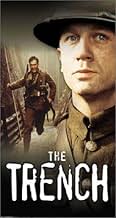IMDb-BEWERTUNG
5,9/10
4360
IHRE BEWERTUNG
Die Geschichte zeigt die Zustände in den Schützengräben und wirft einen Blick in die Gedanken einer Gruppe von Soldaten in den letzten Tagen vor der Schlacht an der Somme 1916 während des Er... Alles lesenDie Geschichte zeigt die Zustände in den Schützengräben und wirft einen Blick in die Gedanken einer Gruppe von Soldaten in den letzten Tagen vor der Schlacht an der Somme 1916 während des Ersten Weltkriegs.Die Geschichte zeigt die Zustände in den Schützengräben und wirft einen Blick in die Gedanken einer Gruppe von Soldaten in den letzten Tagen vor der Schlacht an der Somme 1916 während des Ersten Weltkriegs.
- Auszeichnungen
- 2 Gewinne & 2 Nominierungen insgesamt
Antony Strachan
- Pte. Horace Beckwith
- (as Anthony Strachan)
Handlung
WUSSTEST DU SCHON:
- WissenswertesIn preparation for the film, Writer and Director William Boyd sent the main cast to a replica trench for a night, to experience the conditions the British Army suffered.
- PatzerThe shelling of German trenches and the nomansland before the actual attack was immense. First of all the shelling would have been deafening, secondly, the nomansland would have been a moon-like scenery full of craters and barbwire, not a nice meadow.
- Zitate
Pte. Charlie Ambrose: [in a mocking whine] You can tell your grandchildren, I was wounded by a flyin' tooth.
[everyone laughs]
- VerbindungenFeatured in Being James Bond (2021)
Ausgewählte Rezension
The focus of "The Trench" obviously is on the human aspects of the British men who have gone to war in World War I. It does a good job of portraying the British soldiers with their emotions, thoughts and trepidations about their circumstances in the trenches of northern France. But it also seems to distort some of the human trappings and demeanors of the time. When movies impose modern mores and culture on the past, they distort that time and its culture and history. Thus, people who don't study such things or have knowledge of the times wind up with an inaccurate notion of history or of the reality of that time.
Two things seem obvious as cultural distortions in this film. The first is the casual, almost disrespectful attitude and unruliness of the soldiers. This isn't something that happens just once or twice, but frequently. While all military throughout history likely has had some humor and playful banter among troops at times, it seems to be more of the rule among this platoon of Brits. The second is in the language. Again, all military throughout history likely has had some use of foul or rough language. But here, it seems that this 1916 platoon of British soldiers has adopted early 21st century British street talk (is it really that vulgar among society in England today?). And, I doubt that the British may always have had more vulgar mouths than we Yanks. But, by the standard of this film, the Brits make the service times of my family, from WW II through Vietnam, seem like baby talk.
There may be any number of other distortions as well. Anthony Strachan, who plays Horace Beckwith, is very good in his role. But I doubt that a man so much over weight would have been conscripted or allowed to join the British Army then, or any time. I knew some men a little over weight at my boot camp, but they were whipped into shape by the end, usually with much less weight to carry around. The men in this film seemed almost constantly to be smoking cigarettes. Cigarette smoking grew immensely during WW I, but it wasn't yet to the point shown in this film among British soldiers. In a long documentary film of WWI that came with the DVD of this movie, I didn't see a single scene of men smoking cigarettes on the French, British and German lines. But, several scenes showed Allied soldiers in the trenches smoking pipes.
The last couple of gross inaccuracies are in the setting. The movie folks did a credible job building the set of trenches – except for one thing. Where is the water and mud? The Allied trenches of WWI were notorious for their foul water and mud, yet we don't see any of that here. And, the scene of the battlefield that the Brits have to charge onto is a lush green meadow. That was almost laughable. Both sides had been bombarding that area for days on end. The land was a desolate wasteland.
The distorted portrayal of the conditions and culture are significant enough to cost this film two stars, so I can rate it no higher than six stars. I base that mostly on the fine performances of the cast – all the actors. The setting of this film was in the days leading up to the first day of the British attack in the Battle of the Somme (July 1 to November 18, 1916). That first day – when this film ends – cost more than 60,000 British soldiers wounded or killed. It's considered the bloodiest slaughter in the history of the British Army.
I mentioned a bonus documentary that came on the DVD with this film. "World War I: On the Western Front" is an excellent lengthy documentary of WWI. It is a CBS News documentary that shows only actual battle film of the French, British and German forces. It is narrated by actor Robert Ryan. That documentary is centered around the Battle of Verdun which cost more than 500,000 lives. It shows scenes all along the Western Front. Men are standing in deep water in the trenches. Men and machines try to move over drenched and muddy roads and fields. And, battlefields between the lines are a no-man's wasteland. Not a blade of grass, flower or tree can be seen. None of that was staged by Hollywood, but Hollywood (in the U.S. and abroad) would do well to study such actual war films to better and more accurately portray scenes in war movies.
Two things seem obvious as cultural distortions in this film. The first is the casual, almost disrespectful attitude and unruliness of the soldiers. This isn't something that happens just once or twice, but frequently. While all military throughout history likely has had some humor and playful banter among troops at times, it seems to be more of the rule among this platoon of Brits. The second is in the language. Again, all military throughout history likely has had some use of foul or rough language. But here, it seems that this 1916 platoon of British soldiers has adopted early 21st century British street talk (is it really that vulgar among society in England today?). And, I doubt that the British may always have had more vulgar mouths than we Yanks. But, by the standard of this film, the Brits make the service times of my family, from WW II through Vietnam, seem like baby talk.
There may be any number of other distortions as well. Anthony Strachan, who plays Horace Beckwith, is very good in his role. But I doubt that a man so much over weight would have been conscripted or allowed to join the British Army then, or any time. I knew some men a little over weight at my boot camp, but they were whipped into shape by the end, usually with much less weight to carry around. The men in this film seemed almost constantly to be smoking cigarettes. Cigarette smoking grew immensely during WW I, but it wasn't yet to the point shown in this film among British soldiers. In a long documentary film of WWI that came with the DVD of this movie, I didn't see a single scene of men smoking cigarettes on the French, British and German lines. But, several scenes showed Allied soldiers in the trenches smoking pipes.
The last couple of gross inaccuracies are in the setting. The movie folks did a credible job building the set of trenches – except for one thing. Where is the water and mud? The Allied trenches of WWI were notorious for their foul water and mud, yet we don't see any of that here. And, the scene of the battlefield that the Brits have to charge onto is a lush green meadow. That was almost laughable. Both sides had been bombarding that area for days on end. The land was a desolate wasteland.
The distorted portrayal of the conditions and culture are significant enough to cost this film two stars, so I can rate it no higher than six stars. I base that mostly on the fine performances of the cast – all the actors. The setting of this film was in the days leading up to the first day of the British attack in the Battle of the Somme (July 1 to November 18, 1916). That first day – when this film ends – cost more than 60,000 British soldiers wounded or killed. It's considered the bloodiest slaughter in the history of the British Army.
I mentioned a bonus documentary that came on the DVD with this film. "World War I: On the Western Front" is an excellent lengthy documentary of WWI. It is a CBS News documentary that shows only actual battle film of the French, British and German forces. It is narrated by actor Robert Ryan. That documentary is centered around the Battle of Verdun which cost more than 500,000 lives. It shows scenes all along the Western Front. Men are standing in deep water in the trenches. Men and machines try to move over drenched and muddy roads and fields. And, battlefields between the lines are a no-man's wasteland. Not a blade of grass, flower or tree can be seen. None of that was staged by Hollywood, but Hollywood (in the U.S. and abroad) would do well to study such actual war films to better and more accurately portray scenes in war movies.
Top-Auswahl
Melde dich zum Bewerten an und greife auf die Watchlist für personalisierte Empfehlungen zu.
- How long is The Trench?Powered by Alexa
Details
- Erscheinungsdatum
- Herkunftsländer
- Sprachen
- Auch bekannt als
- Der Schützengraben - Die Schlacht an der Somme
- Drehorte
- Produktionsfirmen
- Weitere beteiligte Unternehmen bei IMDbPro anzeigen
- Laufzeit1 Stunde 38 Minuten
- Farbe
- Sound-Mix
- Seitenverhältnis
- 1.85 : 1
Zu dieser Seite beitragen
Bearbeitung vorschlagen oder fehlenden Inhalt hinzufügen


































